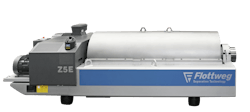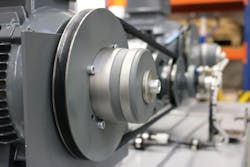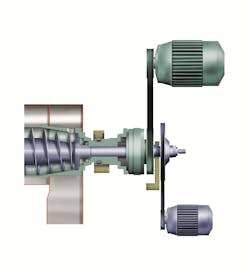Case study: Using decanters for the clarification of vegetable oil
With an increasing demand for mayonnaise, spreads, and the expanding range of other vegetable oil products, the food industry uses fat and edible oil processing to increase production capacity and improve oil quality, particularly at oilseed processing facilities.
Case study 1 — AO Kazan Oil Extraction Plant
AO Kazan Oil Extraction Plant is one of the largest oilseed processing plants in Russia and the largest in the Republic of Tatarstan. AO KMEZ has been using a decanter centrifuge for the clarification of vegetable oils.
In 2018, the facility installed an additional decanter, with the main concerns being operational reliability of the equipment. Based on the results of a technical analysis of parameters from various suppliers and on their experience, AO KMEZ implemented a Flottweg decanter Z6E-4/401.
In 2019, the equipment was delivered and commissioned by the service department of Flottweg Moscow. The decanter operates 24/7 clarifying pressed oil with a capacity of up to 750 tons per day.
The content of phospholipids after clarification is less than 0.2% and the one of non-fat particles is less than 0.07%. Due to its specific features, the German decanter manufacturer delivers the clarified oil in constant quality, even with variable parameters of the pressed oil at the feed.
The technical specialists of AO KMEZ were more than satisfied with the results obtained using the decanter, which is an automated system for dosing process water depending on the flow rate. Constructed of high-quality stainless steel for the product’s wetted parts, it has an impeller for precise and continuous discharges and offers continuous operation.
Case study 2 — ZAO Pavlovskagroprodukt
ZAO Pavlovskagroprodukt from the Voronezh region also produces vegetable oils from sunflower seeds. Previously, the company used two filters for oil clarification. Due to the modernization of the company in 2016, production capacities were increased up to 300 tons of oil per day, and the technology of pressed oil clarification with partial hydration based on the Flottweg decanter Z5E-4/401 was introduced.
According to the results obtained after more than three years of operation, ZAO Pavlovskagroprodukt management has been pleased with the results. The removal of phospholipids from the pressed oil resulted in a reduction of the volume of impurities in the tank farm, therefore improving the efficiency in oil clarification. The quality of the oil which is then sold to the domestic and foreign markets, was also considerably improved.
How it works
When solid/liquid mixtures with a high portion of solids need to be separated, decanter centrifuges are a viable solution. In contrast to chamber filter presses, these solid shell scroll centrifuges or decanters operate continuously. High centrifugal forces separate the finely-distributed solid particles from the suspension.
The modular design makes them useful in a wide variety of industries throughout the world. The centrifuges are adapted optimally to the specific application. Applications range from sludge dewatering to classification or wet classification to the sorting of solids.
To obtain optimum results, solid bowl decanter centrifuges must be custom designed to suit specific separation processes.
Decanter centrifuges separate fine solids from a suspension and optimally clarify the separated liquid. The Simp Drive concept and the adjustable impeller make it possible to adjust the residence time of the mixture in the decanter bowl during operation. If the conditions at the inlet change, the separation result and solids content in the discharge always remain constant.
Custom-made decanter centrifuge solutions for the individual processes helps to achieve optimum separation results.
Mechanical separation of liquids and solids with decanter centrifuges requires high forces. Abrasive materials or media with corrosive properties cause wear, abrasion and erosion. For all decanter components in contact with the product, it is recommened to use high-quality corrosion and acid resistant stainless steels.
Decanter centrifuges can be equipped with different lubrication systems. All lubrication systems allow the rotor bearings to be re-lubricated during operation.
The elimination of consumables (such as filter cloths and filter aids) additionally reduce maintenance and operating costs of decanter centrifuges.
The Flottweg Simp Drive regulates the differential speed of the screw conveyor according to the load. If the differential speed is too low, there is a risk of blockage. With the correct setting, the system protects against overload and blockage. If the separation space is to be sealed against the atmosphere, Flottweg offers various sealing systems, including atmospheric centrifuges, vapor-tight centrifuges, and inert centrifuges.
Various monitoring systems control vibration and speed. The storage temperature of the decanter centrifuge can also be monitored to prevent storage damage.
Modern automation options reduce the effort needed to operate the system to a minimum. This means that these decanter centrifuges, which are used in the pharmaceutical, biotechnology and food industries, can be easily integrated into CIP systems.
With vibration monitoring, vibration is detected by a sensor. If the maximum permissible value is reached, an alarm is triggered, and the centrifuge is switched off. The speed monitoring measures the differential bowl and scroll speed with two inductive proximity switches and displays them digitally.
By monitoring maximum and minimum values, critical operating states are prevented, and relevant safety standards are met. The temperature monitoring of the bearings with resistance thermometers makes remote monitoring possible. The drive motor switches off at a pre-selected temperature limit depending on the application. In this way, bearing damage can be prevented.
Nils Engelke is the PR and Communications Manager for Flottweg SE.






